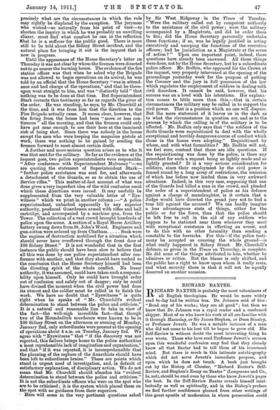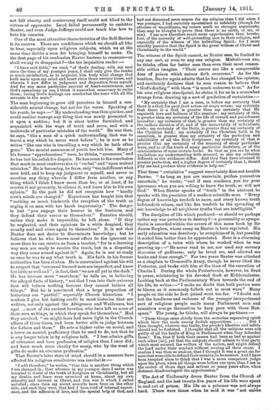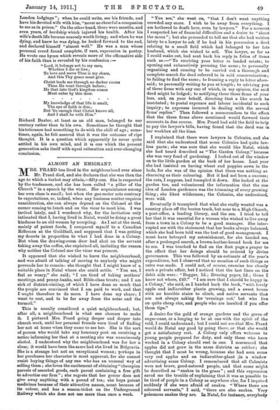RICHARD BAXTER.
RICHARD BAXTER is probably the most voluminous of all English theologians. He would be more widely read to-day had he written less. Dr. Johnson said of him : "Read any of his works ; they are all good" ; but then we know that Dr. Johnson was a rapid reader and a confirmed skipper. Most of us who know his work at all are familiar with it through Macaulay, or Sir James Stephen, or Dean Stanley, or Professor Jowett. He was a notable instance of a man who did not come to his best till he began to grow old. His Self-Review is without doubt the most interesting thing he ever wrote. Those who have read Professor Jowett's sermon upon this wonderful confession may feel that they already know all that Baxter had to tell them of his innermost mind. But there is much in this intimate autobiography which did not serve Jowett's immediate purpose, and upon which he does not touch. A book just brought out by the Bishop of Cheater, "Richard Baxter's Self- Review, and Stephen's Essay on Baxter" (Longmans and Co., 5s. net), should be read even by those who know Jowett's pages the best. In the Self-Review Baxter reveals himself intel- lectually as well as spiritually, and in the Bishop's preface we find further confidences gleaned from other writings of this great apostle of moderation in whom persecution could
not kill charity and controversy itself could not blind to the virtues of opponents. Laud failed permanently to embitter Baxter, and even Judge Jeffreys could not teach him how to hate his enemies.
One of the most attractive characteristics of the Self-Review is its reserve. There are confidences which we should all like to hear, especially upon religious subjects, which we at the same time dislike a man for bringing himself to make. On the first page of his confession Baxter hastens to reassure—or shall we say to disappoint P—the too inquisitive reader :— "I have said little," we read, "of God's dealing with my soul since the time of my younger years, I shall only give the reader so much satisfaction, as to acquaint him truly what change God hath made upon my mind and heart since those unriper times, and wherein I now differ in judgment and disposition from myself. And for any more particular account of heart-occurrences, and God's operations on me, I think it somewhat unsavoury to recite them ; seeing God's dealings are muchwhat the same with all His servants in the main."
The man beginning to grow old perceives in himself a con- siderable mental change, but not for the worse. Speaking of his youth, he says :—" My understanding was then quicker, and could easilier manage any thing that was newly presented to it upon a sudden ; bat it is since better furnished, and acquainted with the ways of truth and error, and with a multitude of particular mistakes of the world." He was then, he says, " like a man of a quick understanding that was to travel a way which he never went before"; he is now as he writes "like one who is travelling a way which he hath often gone." The mental assurance of youth has left him. Many of his former " apprehensions " were, he thinks, "erroneous," and he has lost his relish for dispute. He has come to the conclusion that much in most controversies is "verbal" and "upon mutual mistakes." He is becoming, be fears, only "too indifferent what men hold, and to keep my judgment to myself, and never to mention any thing wherein I differ from another, or any thing which I think I know more than he ; or at least, if he receive it not presently, to silence it, and leave him to his own opinion." In the past he did not recognise how "hardly men's minds are changed." Experience has taught him that "nothing so much hindereth the reception of the truth as urging it on men with too harsh importunity." The danger is lest "you engage their honour in the business, and they defend their errors as themselves." Fanatics should, unless they make it impossible, be left alone. "If they be neglected, and their opinions lie a while despised, they usually cool and come again to themselves." It is not that Baxter does not desire to disseminate knowledge ; but he believes that he who knows most offers to the ignorant no more than he can receive as from a teacher, "for in a learning way men are ready to receive the truth, but in a disputing way they come armed against it." Again, he is not so ready as once he was to say what truth is. His faith in his former authorities has been shaken. He is constrained against his will to suspect that "reverend learned men are imperfect, and know but little as well as I"; in fact, that "we are all yet in the dark." He has become more " cautelous," he tells us, in believing the alleged facts of history, "not that I run into their extreme that will believe nothing because they cannot believe all things." But be is convinced that a large proportion of historians are "partial," especially Church historians. "I confess I give but halting credit to most histories that are written, not only against the Albigenses and-Waldenses, but agai_ -. most of the ancient heretics, who have left us none of their own writings, in which they speak for themselves." Had they survived, " we might have had more light in the Church affairs of those times, and been better able to judge between the fathers and them." He sets a higher value on moral, and a lower on mental, proficiency than be used to do, not that he is any longer taken in by religions talk. " I less admire gifts of utterance and bare profession of religion than I once did; and have much more charity for many, who by the want of gifts do make an obscurer profession."
That Baxter's later state of mind should in a measure have affected his religions conclusions was inevitable
:- "I add therefore," he writes, "that this is another thing which I am changed in ; that whereas in my younger days I never was tempted to doubt of the truth of Scripture or Christianity, but all my doubts and fears were exercised at home, about my own sincerity and interest in Christ, and this was it which I called unbelief; since then my sorest assaults have been on the other side, and such they were, that had I been void of internal experi- ence, and the adhesion of love, and the special help of God, and
had not discerned more reason for my religion than I did when I was younger, I had certainly apostatized to infidelity (though for atheism or ungodliness, my reason seeth no stronger arguments, than may be brought to prove that there is no earth, or air, or sun). I am now therefore much more apprehensive than hereto- fore, of the necessity of well-grounding men in their religion, and especially of the witness of the indwelling Spirit : for I more sensibly perceive that the Spirit is th3 great witness of Christ and Christianity to the world."
The witness of the Spirit cannot, as Baxter sees, be limited to any one sect, or even to any one religion. Misbelievers are,
he thinks, often far better men than even their most reason- able critics imagine. "Their errors are like a conquerable dose of poison which nature doth overcome." As for the heathen, Baxter again admits that he has changed his opinion, and cautiously declares that he sees reason to believe that "God's dealing" with them "is much unknown to us." As for his own religious standpoint, he states it for us in a somewhat strange form, drawing up a sort of gradation of certainties :-
" My certainty that I am a man, is before my certainty that there is a God, for quod facit notum est magic notum: my certainty that there is a God, is greater than my certainty that He requireth love and holiness of His creature : my certainty of this, is greater than my certainty of the life of reward and punishment hereafter : my certainty of that, is greater than my certainty of the endless duration of it, and of the immortality of individuate souls : my certainty of the Deity, is greater than my certainty of the Christian faith : my certainty of the Christian faith in its essentials, is greater than my certainty of the perfection and infallibility of all the Holy Scriptures : my certainty of that is greater than my certainty of the meaning of many particular texts, and so of the truth of many particular doctrines, or of the canonicalness of some certain books. So that as you see by what gradations my understanding cloth proceed, so also my certainty differeth as the evidences differ. And they that have attained to greater perfection, and a higher degree of certainty than I, should pity me and produce their evidence to help me."
That these " certainties " suggest uncertainty does not trouble Baxter. "As long as you are uncertain, profess yourselves uncertain," he wrote; "and if men condemn you for your ignorance when you are willing to know the truth, so will not God." When Baxter speaks of "truth" in the abstract he speaks with the precision of a modern scientific man. " Every degree of knowledge tendeth to more, and every known truth befriendeth others, and like fire tendeth to the spreading of our knowledge to all neighbour truths that are intelligible."
The discipline of life which produced—or should we perhaps rather say was powerless to destroy P—a personality so sympa- thetic is recorded within the covers of this same book by Sir James Stephen, whose essay on Baxter is here reprinted. His early education was desultory; he complains of it but possibly it suited him better than he appreciated. Here is a charming description of a tutor with whom be worked when he was growing up :—" He never read to me, nor used any savoury discourse of godliness; only he loved me, and allowed me books and time enough." For two years Baxter was attached as a chaplain to Cromwell's Army, though he never liked the Protector, and broke with him at the time of the execution of Charles I. During the whole Protectorate, however, he lived in peace, ministering to his devoted flock at Kidderminster. Looking back at the Parliamentary Wars towards the end of his life, he writes :—" I make no doubt that both parties were
to blame, as it commonly falleth out in most wars." Many people on the side he first joined went too far. "I doubt not
but the headiness and rashness of the younger inexperienced sort of religious people made many Parliament men and ministers overgo themselves to keep pace with these Hot• spurs." The young, he thinks, will always be partisans :—
" These things came chiefly from the sectarian separating spirit
which blew the coals among foolish apprentices But I then thought, whoever was faulty, the people's liberties and safety should not be forfeited. I thought that all the subjects were not guilty of all the faults of Sing or Parliament when they defended them I Yea, that if both their camel; had been as bad as against each other [sic], yet that the subjects should adhere to that party which most secured the welfare of the nation, and might defend the land under their conduct without owning all their cause. I confess I was then so zealous, that I thought it was a great sin for men that were able to defend their country, to be neuters. And I have been tempted since to think that I was a more competent fudge upon the place, when all things were before our eyes, than I am in the review of those days and actions so many years after, when distance disadvantageth the apprehension."
The Act of Uniformity drove Baxter from the Church of England, and the last twenty-five years of his life were spent in and out of prison. His life as a prisoner was not always hard. There were times when he said it was " not unlike London lodgings " ; when he could write, see his friends, and have his devoted wife with him, "never so cheerful a companion to me as in prison." On the other hand, there were months, and even years, of hardship which injured his health. After his wife's death life became scarcely worth living; and when he was dying, and knew he was dying, he looked forward to the end, and declared himself "almost well." He was a man whose personal creed found complete, if rare, expression in poetry. He wrote one hymn which reveals more of the affirmative side of his faith than is revealed by his confession :— " Lord, it belongs not to my care, Whether I die or live ;
To love and serve Thee is my share, And this Thy grace must give.
Christ leads me through no darker rooms Than He went through before ; He that into God's kingdom comes Must enter by this door.
• ..... • My knowledge of that life is small, The eye of faith is dim;
But enough that Christ knows all, And I shall be with Him."
Richard Baxter, at least as an old man, belonged to our century rather than to his own. Sometimes he thought that his tolerance had something to do with the chill of age ; some- times, again, he felt assured that it was the outcome of ripe thought. It is a question which apparently he never quite settled in his own mind, and it is one which the present generation asks itself with equal reiteration and ever-changing conclusion.








































 Previous page
Previous page